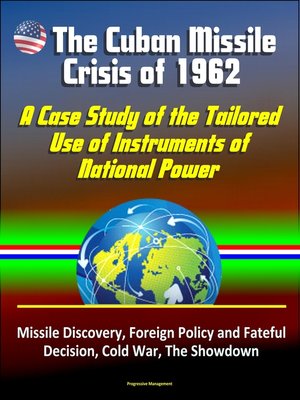The Cuban Missile Crisis of 1962
ebook ∣ A Case Study of the Tailored Use of Instruments of National Power--Missile Discovery, Foreign Policy and Fateful Decision, Cold War, The Showdown
By Progressive Management

Sign up to save your library
With an OverDrive account, you can save your favorite libraries for at-a-glance information about availability. Find out more about OverDrive accounts.
Find this title in Libby, the library reading app by OverDrive.



Search for a digital library with this title
Title found at these libraries:
| Library Name | Distance |
|---|---|
| Loading... |
Professionally converted for accurate flowing-text e-book format reproduction, this report analyzes the foreign policy decisions that were made during the Cuban Missile Crisis of 1962 using the Instruments of National Power (IOP) framework. IOPs are defined in U.S. joint doctrine as "All of the means available to the government in its pursuit of national objectives. They are expressed as diplomatic, economic, informational and military actions and policies." Kennedy had at his disposal the sum of the IOPs of arguably the world's most powerful nation. During the deliberations it became apparent that the instruments of the powerful military and strong economy that the U.S. possessed would not be decisive in the context of this conflict. Although the influence of these two instruments remained significant, they were considered by Kennedy as the lesser desired instruments for this occasion. He determined that the instrument of diplomacy was the most influential to the situation even at its most tense moments.
Conclusion: President Kennedy was able to achieve a foreign policy victory during the Cuban Missile Crisis due to his keen understanding of the principle of tailored IOPs and the discernment he demonstrated while applying them throughout the deliberations. He properly identified and leveraged the influential IOPs against both the Soviet Union and Cuba. He furthered our national interests, challenged communism within the western hemisphere, retained prominence in Europe, and peacefully resolved the Cuban Missile Crisis. His decisions and actions concluded a turbulent and potentially destructive time of U.S. history and provided a demonstration for future administrations of the implementation of the IOPs and their significance during a volatile struggle.







